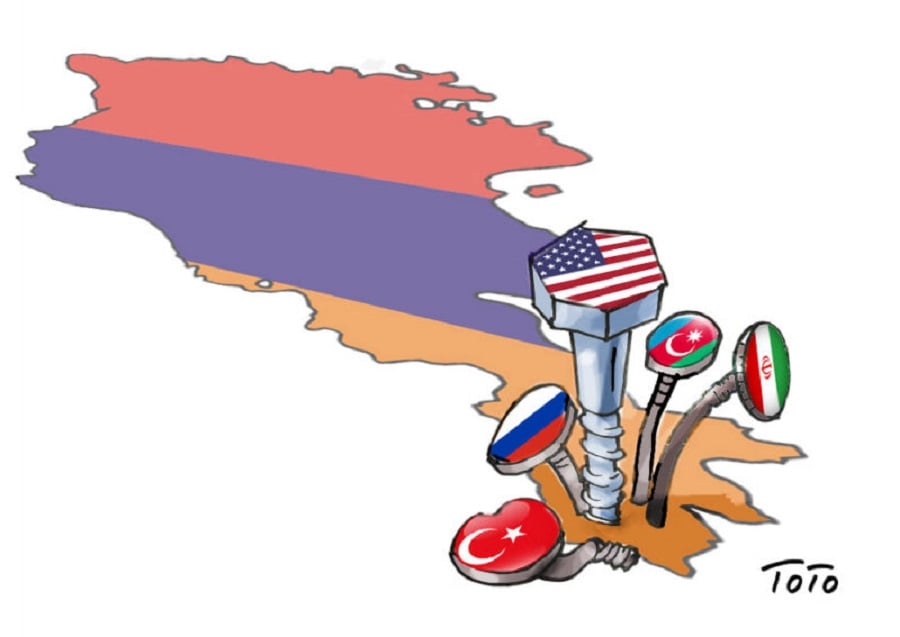As Armenia enters 2025, it is clear that the year will present significant geopolitical challenges for the country. Armenia’s security, political stability, and economic development will continue to be shaped by complex dynamics. The ongoing tensions with Azerbaijan over the so-called Zangezur corridor, Iran’s weakening positions in the region, fall of the Assad regime, the Russian-Ukrainian war and evolving role of Russia in the South Caucasus and the change of global power all lead to a volatile situation.
Iran’s Weakening Positions in the Region
Read also
Iran’s positions in the region have significantly weakened after the downfall of the Assad government in Syria. Previously Iran had been deeply involved in supporting Hafez al-Assad together with Russia but eventually reduced its engagement due to the Iranian confrontation with Israel and other factors. While Iran had traditionally maintained a significant presence in Syria, especially through military bases and alliances with groups like Hezbollah, the recent ascendancy of Turkish-backed forces and the withdrawal of both Russian and Iranian forces from key positions in Syria, as well as Iran’s setback in Israel, led to the loss of Syria and weakening of Tehran’s strategic position in the region.
Another factor that might contribute to Iran’s suppression is US President Donald Trump’s ascendance to power once again on January 20. Given Trump’s previous records of harsh economic sanctions on Iran and Iran’s alleged assassination attempt on Trump, the 47th president of the US will possibly make US policy towards Iran harsher. One former Trump official even highlighted that “Tightening the economic noose around Iran is going to be a day one foreign policy priority to start cleaning up Biden’s Middle East mess.”
Iran’s diminishing influence in the region could pose a challenge for Armenia, especially in light of the ongoing discourse around the so-called Zangezur corridor. It is important to note that Armenia considers Iran as its ally, especially in countering Turkish and Azerbaijani plans of opening this corridor as a link between Azerbaijan and Turkey through the territory of Armenia. The Iranian leadership, including Supreme Leader Ayatollah Khamenei, in the past had repeatedly expressed its opposition to such a corridor. However, following the downfall of the Assad regime in Syria, the Iranian stance on the matter may be weakened.
Iran has already agreed to engage in talks with Turkey about this issue — signaling potential concessions. As Turkey becomes more assertive, under President Recep Tayyip Erdogan, Iran may find itself increasingly forced into compromising its positions on this and other issues.
Consequently, Armenia’s reliance on Iranian assistance could be unpredictable, especially if broader geopolitical dynamics continue to shift. Thus, it’s crucial to diversify Armenian security partnerships and diplomatic engagements.
Fall of the Assad Regime
Another potential challenge for Armenia in 2025 could be the influx of Armenians from Syria, a situation closely tied to the shift of power in Syria and the fall of the Assad regime. The country that benefited most from the Assad regime’s fall is Turkey, as the Syrian opposition gained power largely through Turkish support. This has led to the expansion of Turkey’s influence, while Russia and Iran’s positions have weakened, with their presence in Syria likely to diminish further in the near future.
This shift in regional dynamics is a concern for the Armenian community in Syria, especially during such an unstable period. The Armenian community in Syria currently faces two key challenges: first, safeguarding the community’s security, and second, ensuring that its religious, cultural rights, and identities are respected by the authorities. Armenian Member of the Syrian Parliament Maria Gabrielyan provided an update on the current situation in Syria by reporting that despite challenges, the Syrian-Armenian community is gradually returning to normalcy: “Schools are being reopened, and community life is set to resume soon, with all canteens and cafes now operational.”
However, new events are unfolding nearly every hour, primarily driven by global factors. This means that while the situation appears relatively calm and the Armenian community is returning to its normal rhythm, it remains fluid and the situation could change at any moment. This is an uncertain period for the Armenian community, and as a result, there could be waves of Syrian Armenians once again emigrating to Armenia. The Armenian government must be prepared to address this challenge and provide the necessary support to these Armenians.
Russian-Ukrainian War
Another challenge for Armenia is the ongoing Russian-Ukrainian war. Whatever the outcome is, it is going to inevitably influence Armenia. John Lough of the British policy institute Chatham House identifies 4 possible scenarios for the war outcome: “1.‘Long war’ – An attritional conflict that tests each side’s limits, 2.‘Frozen conflict’ – An armistice that would stabilize the front line where it is. 3. ‘Victory for Ukraine’ – A Western policy shift on support that allows Ukraine to force Russia back to at least the demarcation line of 23 February 2022. — 4. Defeat for Ukraine’ – Ukraine’s acceptance of Russian terms of surrender (change of government, demilitarization, neutrality) and territorial losses.”
Armenia has distanced itself from Russia on the Ukraine issue, with Prime Minister Nikol Pashinyan affirming that Armenia is not an ally of Russia in this conflict. This divergence from Moscow reflects Armenia’s evolving foreign policy, which seeks to balance traditional alliances with the need to reduce dependence on Russia.
Economically, Armenia has benefited from the conflict, as trade between Armenia and Russia has significantly increased. However, despite the immediate economic gains, increasingly continued cooperation with Russia on this matter could mean greater pressure from the West to adhere to sanctions limiting future growth. Armenia has already taken some steps decreasing Russia’s opportunities for sanction circumvention through Armenia. Thus, the prolonged war might mean more pressure for Armenia’s economic ties with Russia that are not in line with the Western sanctions.
As for the geopolitical impact on Armenia, while Russia remains deeply engaged in the conflict in Ukraine, its capacity to engage in South Caucasian regional issues, including those related to Armenia’s security, has significantly diminished. This means that Armenia will likely face a reduced Russian presence and involvement in the South Caucasus, which in turn will drive Armenia to further diversify its foreign relations, fostering closer ties with countries such as the United States, European Union, and other powers like Iran, India, and China, in order to reduce its dependency on Russia. The Armenian government will also continue to pursue normalization of relations with Turkey and Azerbaijan to achieve the goal.
However, Russia’s victory might lead to its deeper engagement within the region and Armenia. Hence it is crucial for Armenia to pursue balanced relations with all the important actors in the region regardless of the outcome of the war.
Azerbaijani-Turkish Aggression
One constant and crucial challenge for Armenia is the danger of Azerbaijani-Turkish attacks against Armenia. Since the 44-day war of 2020, Azerbaijani rhetoric has become more aggressive with President Ilham Aliyev constantly making statements to justify further attacks against Armenia. One recent remark was made in an interview with Azerbaijani television channels on the night of January 7, when Aliyev said: “Armenia is effectively a source of threat to the region. The independent Armenian state is essentially a fascist state. For nearly 30 years, this country was governed by bearers of fascist ideology, and they shaped the state in their own image. Therefore, fascism must be eradicated.” He added: “It will either be eradicated by Armenia’s leadership or by us. There is no other way.”
Such statements are only a way for Aliyev to legitimize future attacks on Armenia, the danger of which unfortunately remains significantly high. Meanwhile, Turkey is actively promoting the idea of the “Zangezur corridor.” With Iran’s influence diminishing in the region, Turkey managed to secure negotiations with Iran on the matter-signaling potential concessions. As Turkey grows more assertive, as noted above, Iran could be compelled to soften its stance on the Zangezur issue, leaving room for a serious security threat for the Republic of Armenia.























































